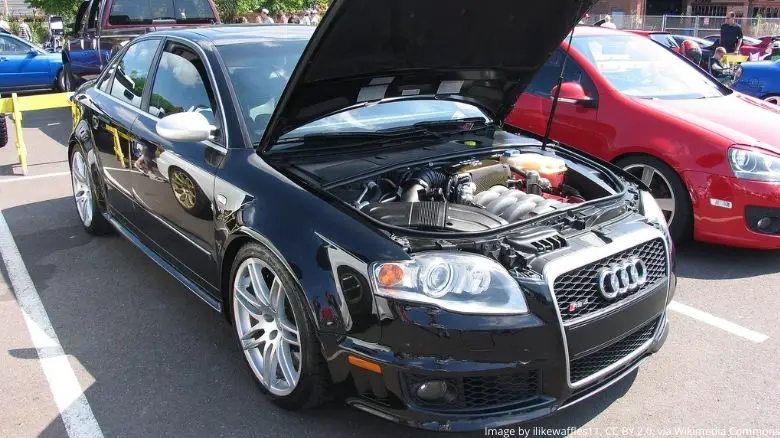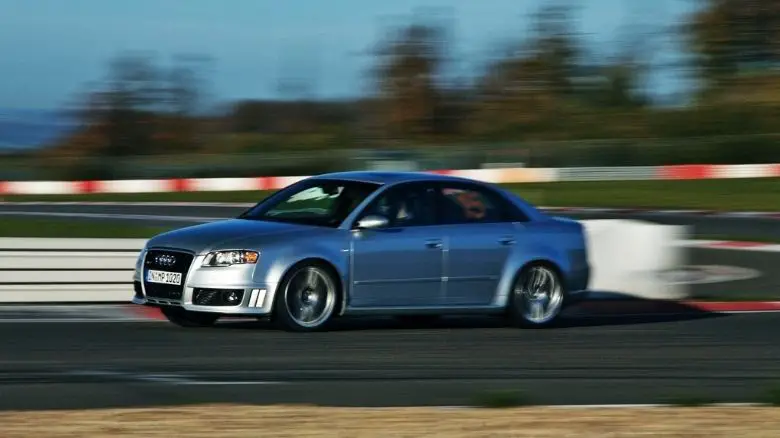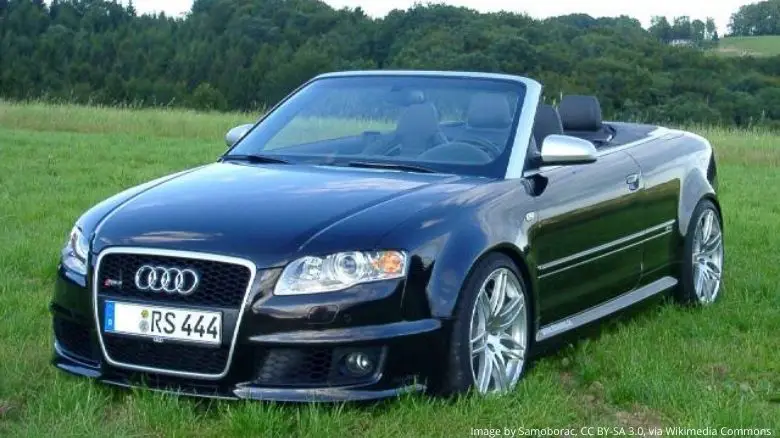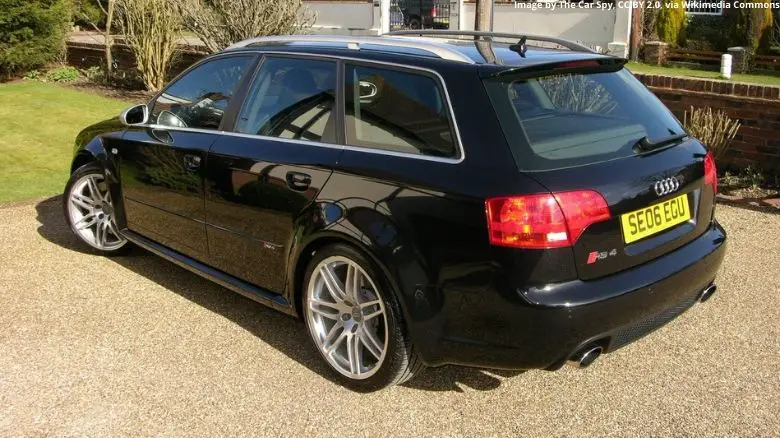Is the Audi RS4 B7 a Future Classic? (And Should You Invest?)

Adam
Founder, The Car Investor
The Audi RS4 is the most powerful version of the flagship A4 range, and the B7 version was first unveiled back in 2005 as the answer to BMW's mighty E46 M3, and the E92 that was to follow.
But we're not going to start comparing it to the M3 as so many before us have, because the B7 was a phenomenal car in its own right.
In fact, so much so that serious car investors are now starting to question whether this rapid RS is worth their money.
So is the Audi RS4 B7 a future classic?
The Audi RS4 B7 will be a future classic thanks to its fantastic naturally aspirated V8 engine, six-speed manual transmission, superb handling, and short production-run.
So the RS4 is likely to become a classic, but how rare is it, and is it reliable enough to be considered as a daily driver?
Audi RS4 B7 specs
What engine did the B7 RS4 have?
The B7 RS4 featured a 4.2-liter naturally aspirated V8 producing 420 horsepower, creating one of the most characterful powerplants of its era.
Unusually for an Audi RS car, the German manufacturer decided against turbocharging and instead relied on the raw, linear power delivery of natural aspiration.
This decision now appears prescient, as such engines have become extinct in modern performance cars.

The resulting soundtrack is absolutely magnificent. The V8 rumbles and roars its way to the 8,000+ rpm redline, then gargles and crackles like a mechanical symphony on the overrun.
This visceral acoustic experience has become impossible to replicate with modern turbocharged engines and stringent emissions regulations.
What gearbox did the B7 RS4 have?
The B7 RS4 was exclusively available with a six-speed manual transmission, bucking the contemporary trend toward semi-automatic systems that dominated executive performance cars by 2006.
While Audi's manual-only decision initially raised eyebrows among some critics expecting paddle-shift technology, it has become one of the RS4's defining characteristics.
Even then, a proper stick-shift connected to a naturally aspirated V8 was becoming rare - today, it's virtually extinct.
This transmission choice has proven crucial to the car's classic car appeal, as manual gearboxes have become the holy grail for driving purists seeking authentic engagement in an increasingly automated automotive world.
Audi RS4 B7 0-60
The B7 RS4 achieves 0-60 mph in 4.6 seconds, impressive figures that remain competitive with many modern performance cars despite being nearly two decades old.
The Quattro all-wheel-drive system ensures exceptional traction from standstill, eliminating wheelspin issues that plague more powerful rear-wheel-drive alternatives.
This mechanical grip advantage makes the RS4's performance accessible in all weather conditions.
Audi RS4 B7 top speed
The RS4's top speed is electronically limited to 155 mph, though many owners report exceeding 160 mph even with the limiter engaged. Unrestricted examples reportedly reach approximately 190 mph, demonstrating the V8's continued pull at high speeds.
Audi RS4 B7 MPG
The B7 RS4 averages around 14 mpg in mixed driving, with some owners reporting over 20 mpg during extended highway journeys. This thirst reflects the naturally aspirated V8's character and the era's different priorities regarding efficiency.
Modern buyers should approach RS4 ownership understanding that fuel consumption represents the price of admission for one of the last naturally aspirated performance experiences available.
What is the B7 RS4 like to drive?
Advertisement
The RS4 delivers exceptional driving pleasure through its combination of powerful naturally aspirated engine, lightweight construction, and sophisticated Quattro all-wheel-drive system.
Owners consistently praise the RS4's impressive acceleration, cornering capability, and overall engaging driving dynamics. The car manages to combine supercar-level performance with practical family car usability - a combination that has become increasingly rare.

The driving experience differs fundamentally from modern turbocharged alternatives. Power delivery builds linearly and predictably, without the sudden surge characteristic of forced induction. This creates a more natural, intuitive relationship between throttle input and acceleration that many enthusiasts prefer.
Daily usability remains excellent despite the performance focus. The RS4 functions effectively as family transportation while offering immediate access to genuine excitement when conditions permit.
Is the B7 RS4 reliable?
Overall, the Audi B7 RS4 demonstrates impressive reliability, with owners reporting minimal major issues when proper maintenance schedules are followed. While Audi's general reliability reputation has been questionable, the RS4 represents one of their more successful engineering efforts.
Common issues to monitor include:
Suspension problems: The Dynamic Ride Control (DRC) system can develop fluid leaks, though many examples have been upgraded with aftermarket solutions that often improve both reliability and performance.
Carbon build-up: Direct injection engines accumulate carbon deposits that require periodic cleaning every 20,000-30,000 miles. This maintenance costs approximately $500/£400 but significantly impacts performance when neglected.
Oil cooler pipe corrosion: Design deficiencies can cause oil leaks requiring cooler replacement. Many examples have been addressed, but buyers should verify this work has been completed.
Brake wear: High-performance driving naturally accelerates brake component wear, though this reflects enthusiastic use rather than design flaws.
These issues represent manageable maintenance items rather than fundamental reliability problems. Well-maintained examples provide dependable service while delivering exceptional performance.
Is the Audi RS4 B7 rare?
Advertisement
Audi produced approximately 10,000 RS4 B7s globally across all body styles, with roughly 2,000 reaching the USA and 3,500 sold in the UK. These modest production figures already indicate future collectibility.
Body style availability varied by market: Saloon, Avant (wagon), and Cabriolet versions were offered in Europe, while the USA missed the Avant variant entirely. The Cabriolet represented the rarest configuration with production numbers in the hundreds per market.

Interestingly, the saloon commands highest desirability despite being more common than the Cabriolet, reflecting enthusiast preference for optimal structural rigidity and performance.
American market rarity proves particularly significant, as the B7 represented the only RS4 generation sold in the USA. Subsequent B8 and B9 generations never reached North American shores, making the B7 a unique opportunity for American enthusiasts.
Compared to contemporary competitors, the RS4's 10,000-unit production run seems modest, enhancing its exclusivity in today's marketplace where rarity increasingly drives values.
Audi RS4 B7 price
Current market pricing averages $35,000-45,000 in the USA and £20,000-30,000 in the UK, representing significant appreciation from the steady values that persisted for years.
Market dynamics shifted dramatically around 2020 when collector recognition accelerated appreciation of the finest examples. This trend has continued, with exceptional low-mileage cars commanding substantial premiums above average pricing.
Investment-grade examples now require budgets exceeding these averages by several thousand dollars/pounds, though long-term appreciation potential may justify the premium for quality-focused buyers.
The appreciation trajectory appears sustainable given the car's unique position as the last naturally aspirated, manual-transmission RS4, combined with limited production numbers and growing collector recognition.
Is the Audi RS4 B7 a good investment?
Advertisement
Values of the Audi RS4 B7 continue rising steadily, making it both an excellent investment opportunity and a practical performance car for regular use - a rare combination in today's market.
The RS4 possesses all the ingredients for classic car success: end-of-era drivetrain technology, practical everyday usability, limited production numbers, and increasingly recognized significance in automotive history.
The naturally aspirated V8 and manual transmission combination offers experiences that modern cars simply cannot replicate. Emissions regulations and market demands have eliminated such powertrains from contemporary offerings, ensuring the RS4's uniqueness will only grow.
Reliability advantages distinguish the RS4 from many performance cars of its era. While older Audis often suffered reliability issues, the B7 RS4 demonstrates unusual dependability that supports practical ownership alongside investment potential.

Performance remains genuinely impressive by current standards, while the understated aesthetic appeals to enthusiasts preferring subtlety over ostentation. The RS4 delivers supercar performance without supercar pretension.
Market timing favors current buyers, as prices of exceptional examples continue rising while decent cars remain accessible. However, the window for reasonable pricing appears to be narrowing as collector recognition accelerates.
Production volume limitations mean that finding quality examples will become increasingly difficult as the market matures. Early action provides access to better selection and pricing before full collector recognition drives values beyond casual enthusiast reach.
Investment perspective suggests strong potential for continued appreciation, particularly for well-maintained manual transmission examples. The combination of rarity, technological significance, and practical usability creates compelling investment fundamentals.
Beyond financial considerations, the RS4 offers access to automotive experiences that have become extinct in modern cars. The naturally aspirated V8's linear power delivery, manual transmission engagement, and mechanical purity provide connections to driving that current technology cannot replicate.
For enthusiasts seeking both driving pleasure and investment potential, the RS4 B7 represents one of the last opportunities to acquire such experiences at relatively accessible pricing. Time appears limited before full classic car recognition prices out casual buyers entirely.
The RS4 B7 stands as the definitive expression of Audi's performance philosophy before forced induction and automation became mandatory. It captures everything wonderful about the naturally aspirated era while providing modern usability that ensures practical enjoyment alongside potential appreciation.
No spam. We'll only email you when it matters.

About the Author
Adam is the founder of The Car Investor, combining his passion for classic cars with data-driven investment strategies to help collectors maximize their returns.
View all articles →Related Articles

Volvo 850 T-5R: The Sleeper That Shocked the Performance World
The Volvo 850 T-5R and 850 R have evolved from unconventional performance cars to cherished modern classics, representing one of the most successful transformations of a conservative brand into a genuine performance force.

Alfa Romeo 147 GTA: The Beautiful Lunatic That Defied Logic
The Alfa Romeo 147 GTA stands as automotive proof that passion can triumph over practicality, creating one of the most characterful and increasingly valuable hot hatchbacks ever built.

Will the Jaguar F-Type Become a Classic?
The Jaguar F-Type represents a fascinating case study in modern classic car potential. Launched in 2013 as Jaguar's spiritual successor to the legendary E-Type, the F-Type marked the British marque's return to dedicated sports car manufacturing after a 40-year hiatus.
Advertisement